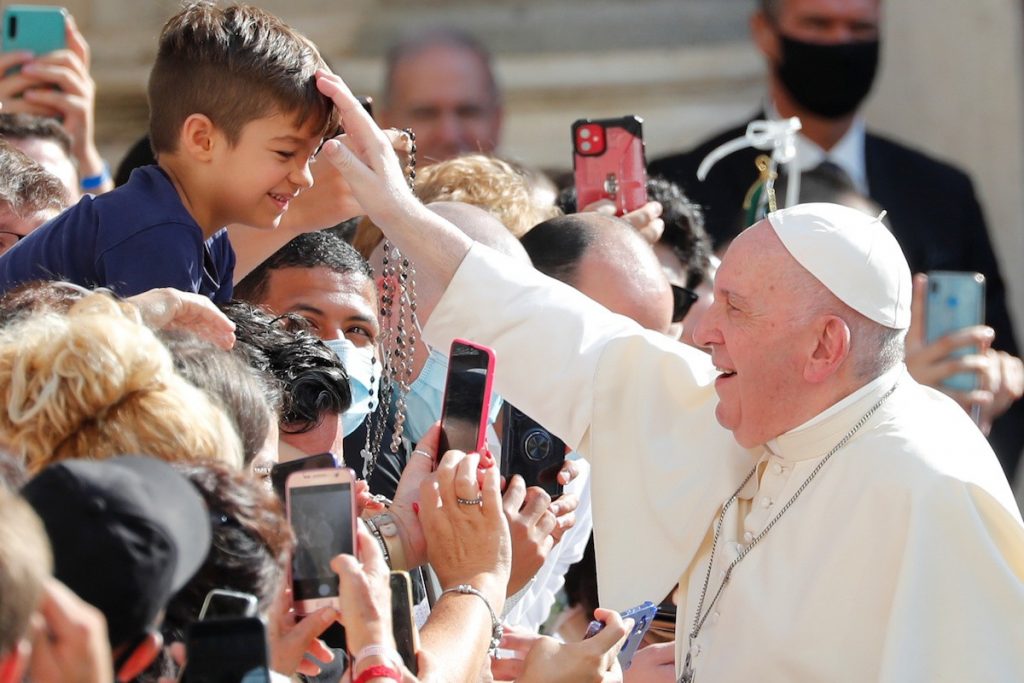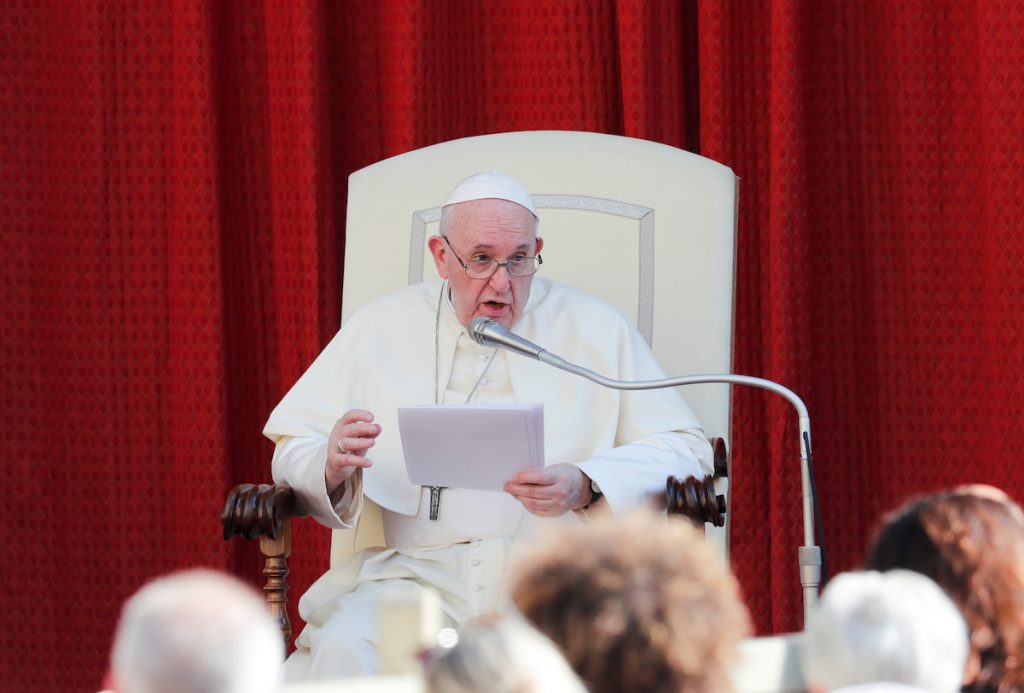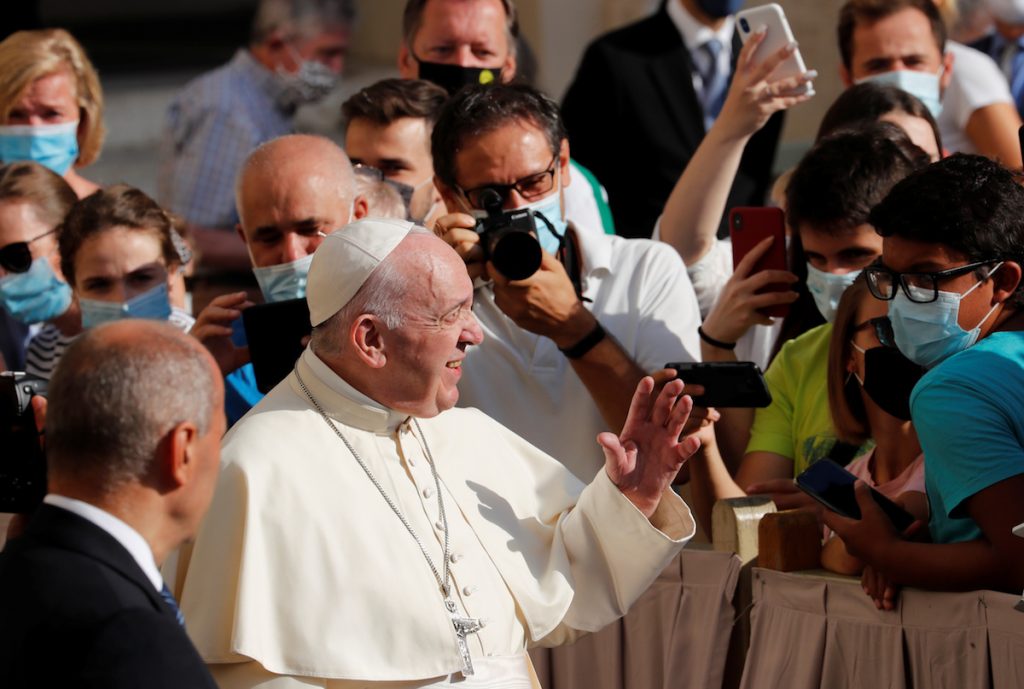
Pope Francis stressed on the need to build a “civilization of love,” which he said goes beyond personal relationships, to address the impact of the global health crisis.
“A virus that does not recognize barriers, borders, or cultural or political distinctions must be faced with a love without barriers, borders, or distinctions,” said the pontiff in his weekly address.
In his General Audience on Sept. 9, Pope Francis said humans are social and political beings who are capable of the “highest expressions of love.”
The pope said “social and political love” are necessary to human development for people to be able to face any type of crisis.
“We know that love makes families and friendships flourish,” he said.
“But it is good to remember that it also makes social, cultural, economic, and political relationships flourish, allowing us to construct a ‘civilization of love,’” added the pontiff, quoting Pope St. Paul VI.
He said inclusive love can “generate social structures that encourage us to share rather than to compete.”

The pope said that this kind of love allows people “to include the most vulnerable and not to cast them aside” helps people express “the best in our human nature and not the worst.”
“True love does not know the throw-away culture, it does not know what it is,” he said.
“In fact, when we love and generate creativity, when we generate trust and solidarity, it is then that concrete initiatives emerge for the common good,” added the pope.
Pope Francis said the expression of affection and compassion “is valid” at both the level of the smallest and largest communities, and in the international level.
“What is done in the family, what is done in the neighbourhood, what is done in the village, what is done in the large cities and internationally is the same, it is the same seed that grows, grows, grows and bears fruit,” he said.
“If you in your family, in your neighbourhood start out with envy, with battles, there will be war in the end,” added the pope.
“If you start out with love, to share love, forgiveness, there will be love and forgiveness for everyone,” said the pontiff.
He said that in the absence of social love, “the egotistical, indifferent, throw-away culture prevails.”
Pope Francis said humanity will emerge from the pandemic “for the better if we all seek the common good together.”
He warned that if “partisan interests” prevail, humanity will emerge from the crisis for the worse.
The pontiff lambasted those he called “devotees of Pontius Pilate” who “wash their hands of other’s suffering.”
He said there are people who would like to “appropriate possible solutions” against the coronavirus disease for themselves.
The pontiff said there are some who try to develop vaccines for the virus for business.
“Some are taking advantage of the situation to instigate divisions: By seeking economic or political advantages, generating or exacerbating conflicts,” he said.

Pope Francis urged people to be persons who are kinder and nobler by sharing their own good to everyone.
“Health, in addition to being an individual good, is also a public good. A healthy society is one that takes care of everyone’s health, of all,” he said.
The pontiff said humanity may survive from the health crisis, but not from the human and social crisis if humanity will resort in solutions that “bear the imprint of egoism.”
“To build a healthy, inclusive, just, and peaceful society we must do so on the rock of the common good,” he said.
Pope Francis reminded the faithful that the Christian response to the pandemic and to the consequent socio-economic crisis must be based on love.
He said that love must be unconditional and must be expressed even toward perceived enemies.
“This is Christian wisdom, this is how Jesus acted. And the highest point of holiness, let’s put it that way, is to love one’s enemies which is not easy, it is not easy,” he said.
“Certainly, to love everyone, including enemies, is difficult — I would say it is even an art! But an art that can be learned and improved,” he added.
The pontiff said true love that makes people fruitful and free “is always expansive” and “inclusive.”
“This love cares, heals, and does good,” he said.
“How many times a caress do more good than many arguments, a caress, we can think, of pardon instead of many arguments to defend oneself. It is inclusive love that heals,” said the pope.
Source: Licas Philippines
0 Comments